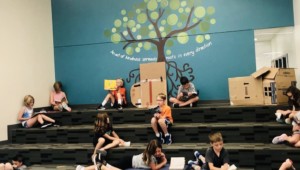Getting Through: Leading with Optimism Hope and Love

By: Kristi Dominguez, Ellen Dorr & Kelly Niccolls
In a time when most days feel more uncertain than certain, leaning into resources of optimism, hope and love have proven to be key strategies that continue to propel leaders onward, envisioning a better tomorrow, for generations to come. The reality is that our current educational system wasn’t designed with an intent to meet the needs of all children, and COVID-19 has shined a glaring spotlight on the inequalities within the historically white patriarchal system.
As a leader, we have to accept what this moment in time is, a crisis, but it is also a pause, an opportunity to redesign a broken system. Although today we may not know what to do, we do understand that by braiding the honest truth with an increased focus on courageous leadership, we can begin to develop the mindset and power to reimagine what can and must be built from here.
It begins now by shifting our thinking from responding to recovering. Knowing that when we walk back down the halls of our brick and mortar buildings, we need to be mindful to use this moment to transform the function of our classrooms. We need to shift our mindset from one that upholds the traditional white patriarchal narrative to system-thinking that truly engages all students. A system that elevates student/family voice, race, gender identity, class, and/or ability in a way that education has not previously uplifted, especially for marginalized communities.
In a recent conversation, a leader called out this tension but framed it around a focus of how we will ‘catch students up.’ We have also watched leaders in zoom after zoom, stressed and paralyzed by a pressure to lead, quickly finding that they can’t take what they know about leading a school and successfully transfer it to this new environment. What both leaders know and understand is in their experience of school leadership with a ‘white normed’ overlay. That overlay doesn’t fit in this new context and in actuality, it never fit before COVID-19.
As we reimagine what we can accomplish when redesigning the system, we also must courageously call out this tension leaders are experiencing. We can’t help but wonder if this discomfort for many isn’t grounded by a fear of loss in identity? Questions might surface, such as: “If school changes, who am I? What kind of leader am I? Will I lose my privilege? My perceived sense of power?”
Leveraging Optimism, Hope and Love Strategies
To make these changes and move our systems to educational justice, we must leverage optimism, hope, and love as strategies. This is a move toward abundant, strengths-based thinking. This is not to say that we are ignorant of the damage current educational systems cause and it does not mean misunderstanding the amplification of privilege during this crisis. What it means instead is that we are bold enough to build something different. Tinkering around the edges now has the additional opportunity of being burnt down—merging these fires and energy to recreate something better.
Hope (about potential and imagination) means:
- Asking: what would education look and feel like ideally?
- What better or ideal future can we imagine?
Optimism (about positivity) means:
- Asking: what are students gaining during this time? How are these experiences enhancing their humanity?
- Noting how we see systems changing and improving and determining how can we be part of this progress
Love (about care and clarity) means:
- Asking: how can we hold space for our students, families, and staff to move through this crisis together?
- Centering our students and families and their needs
- Seeing the strength, resilience, and brilliance of our students and identifying those, not privilege and access, as the real assets
- Asking, about any and all decisions, “Who does this privilege? Who does this harm?” and then making different decisions/policies/etc. when we have those answers.
- Calling out privilege and caring enough about all of our students to stop systems that encourage opportunity hoarding.
Reimagining Systems
Leading with optimism, hope, and love allows us the ability of reimagining systems to include elevating the voice of all stakeholders, especially students and families. This leadership drills down to the idea that allows us to create a future for learning and schooling that is based on the hopes and dreams of the individuals that we work in service of. It requires an ability to get granular in decision making that pushes us to think of each student, not generalizing all students.
We will reference individual stories and needs, not generic trends across a system. As the University of Washington Leading for Learning doctoral students, we pride our development in a key standard: system-focused leaders demonstrate leadership for equity and excellence, they facilitate collective action to transform systems towards educational justice in partnership with students, families, communities, system based actors, and other stakeholders.
Leading with optimism, hope and love also acknowledges that students are learning during this time, but maybe not in the ways that are traditionally measured by educational systems, perhaps making this even more of a powerful experience. Now is the time to consider, how are we measuring engagement? Who is currently in charge of the narrative? How do we bring about joint ownership? How can we best design a system grounded in joint ownership, with a true belief that the voices of our children are more powerful than ever before?
Recovery
In a time of corruption, to nurture is a revolutionary act (George C. Wolfe). Leading with optimism, hope and love is a necessity to heal the wounds from oppressive school systems and the fractured fallout with mandated COVID -19 school closures. We can heal stronger and better than we were before. We can intentionally learn from this experience and apply what we need next in ways that empower our students and engage our communities.
Love, optimism, and hope is the sustenance for the long, hard journey towards improved teaching and learning systems. We will build together, with improved tools, resources, and processes. We will look upon this moment of distress with gratitude, as it was our catalyst for an improved future.
For more, see:
- Podcast: Kristi Dominguez & Ellen Dorr: Leading Central Systems Through COVID-19 with Optimism, Hope & Love
- How to Re-open Schools: A Ten Point Plan Putting Equity at the Center
- Getting Through: Distributive Leadership
- Community Success by Design
Kristi Dominguez is the Executive Director of Bellingham Public Schools. You can find her on Twitter at @kdomingu.
Ellen Dorr is the Chief Technology Officer in Renton Schools. You can find her on Twitter at @ellenjdorr.
Stay in-the-know with innovations in learning by signing up for the weekly Smart Update.







0 Comments
Leave a Comment
Your email address will not be published. All fields are required.